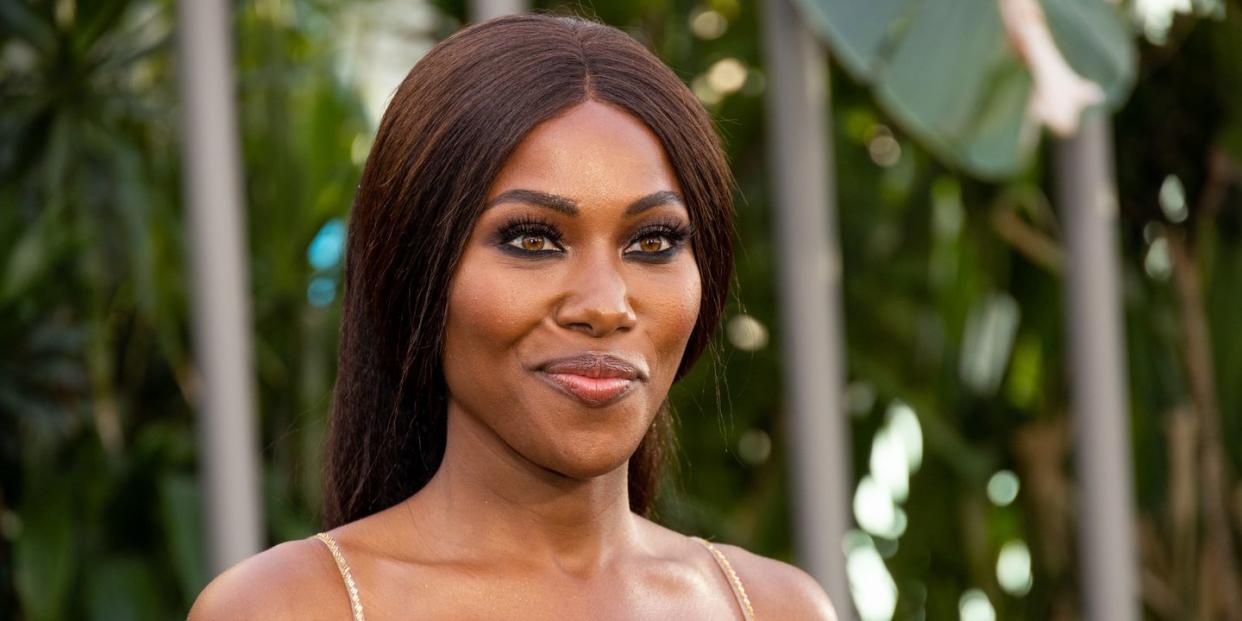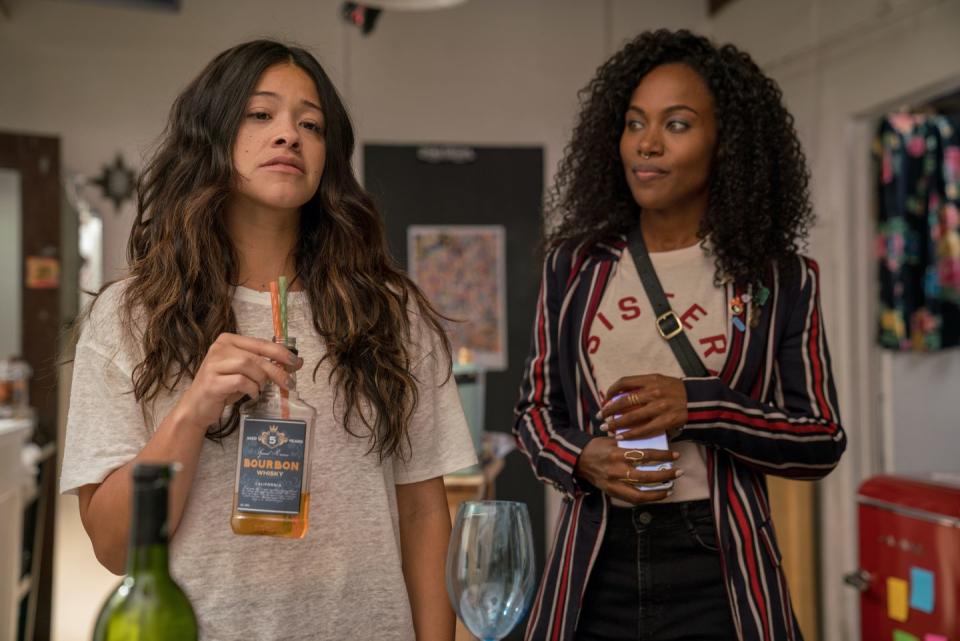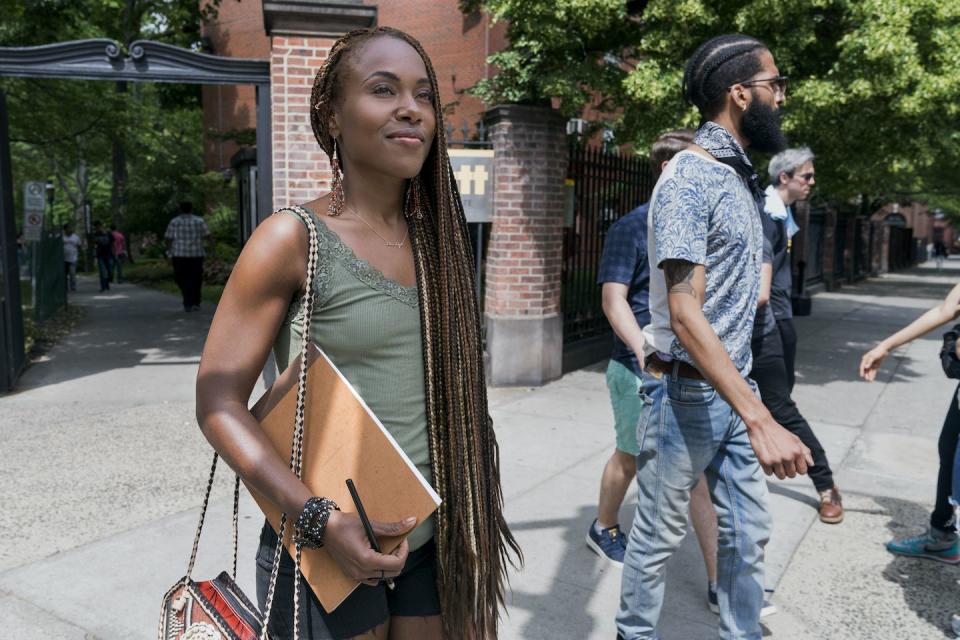"Jurassic World: Dominion" Star DeWanda Wise Doesn’t Have Anything to Prove

- Oops!Something went wrong.Please try again later.
- Oops!Something went wrong.Please try again later.
DeWanda Wise has landed high-profile leading roles in the past few years, like Spike Lee’s canceled-too-soon TV series She’s Gotta Have It and the beloved rom-com Someone Great, but the actress is hesitant to categorize them as big breaks. “I think big breaks are a PR construct,” she declares over Zoom from her Pasadena home. "Especially if you are me—a Black woman or a woman in this industry—'big break' entails there's a moment at which then you crest over and suddenly it’s magically easier. That's just not the reality."
Still, the 38-year-old actress’s career is undeniably on the upswing. Earlier this summer, she starred in the long-awaited third film in the Jurassic World trilogy, Jurassic World: Dominion, and Wise is set to play one of the leads in the TV adaptation of Three Women, Lisa Taddeo’s compelling tale of modern sexuality. Next, she’s focusing on narrating the feature-length audio play Wake, which details the hidden history of Black women uprising against slavery. “[Dr. Rebecca Hall’s] capacity to link her grandfather's slave history to her own life—that ability is important,” she says of the project. “I wish it was something that everyone had. It would make a lot more of us feel a little less alone.”
Ahead, Wise shares the importance of telling empowering stories of Black women, following your intuition (it led her to a life-changing role), and of aligning your purpose to your personality.
Jurassic World: Dominion was such a huge moment for you. How did you prepare for your first action movie?
Very traditionally. I'm super old-school in many respects. One, I had wanted to work in the action space for years. For actors, this is it. We have our bodies, we have our voice, so however you believe an actor should be physically, there's always a degree of just honoring yourself and taking good care of yourself—whatever that looks like and feels like for you. I moved [to California] in 2012 and started working with a trainer for the first time, Raven Harrington, and she reminded me even then [that] I was gonna work in an action film and be an action star. It was very much a matter of, like, dress for the job you want. So it was partially bumping up what I had been doing: eating protein, carbs, and vegetables, lifting very heavy weights, and creating the illusion of this shape. I just worked out for two hours a day for over a year. There is no secret. There's no, like, “Oh, I did this special thing.”
I understand you don’t really believe in big breaks, but how would you define yours if you had to?
The actors I’ve worked with, actors I’m working with presently, have a very temperate and grounded understanding of what this industry actually is and what it entails. It's one of the only industries where past success does not determine or promise future success. You could win an Oscar and not get a phone call afterward, so I'm very temperate about it. My big break was when I started. I've been starring in things since I was a kid, and I don't really have a hierarchy between Jurassic World: Dominion and playing Electra in college. To me, it’s all part of the same, larger narrative of my life. And one thing connects to the other.

I absolutely loved the movie Someone Great. How did it transform your career?
The fun we had—the joy with which that movie was made, the sorority, the experience of making that movie—really changed my life. Our group chat is called Neon Classics. I love those women. I’d already loved Gina Rodriguez; we went to NYU together. I’ve known her for half of my life at this point, and I just reached out to her because my intuition was like, There’s a role for me in this movie. It was literally the day after Captain Marvel fell through for me, and we just had such a beautiful time. There was no agenda. In that way, I’ve started being more thoughtful, deliberate, and investigative about what projects I’m looking into. I have a lot of fun at work now as a result of Someone Great.
The ending of Spike Lee's She's Gotta Have It felt abrupt. Were you frustrated that it ended early? Did you hope it would get saved?
I don't have a hard time letting go of anything. Part of the reason I got into acting is because I was an avid quitter. Growing up, I'm thankful I didn’t have a mom who was like, “You need to stick it out,” because I wouldn’t have found acting, which really facilitated and honored my need for change. I'm a natural wanderer; my name means “wanderer.” It's just in my DNA. So, with She’s Gotta Have It, we told two complete stories back to back—Spike is a filmmaker, ultimately. It wasn't a traditional TV scenario where you have this cliffhanger and all these questions. I was really satisfied with what we were able to create. I think for the moment, at least, I said everything I needed to say as Nola Darling. You can only play those characters for so long anyway before people are like, “Are you gonna grow up?”

You have another project that started in June—the audio play Wake. How did you get involved in that?
Wake is a true self-project. In a lot of my work, my interest is in history; my characters always have these rather arduous backstories no matter what the project is, so I just found a real kindred in Dr. Rebecca Hall. We share a certain perspective on the enslavement of Black people in America. There's a lot of shame around it. There’s a certain white supremacist lens, which goes like, “Stop talking about it,” that a lot of Black people have ingested and regurgitated. We had a mutual kind of understanding, so if we’re claiming this intergenerational trauma in our DNA, then what else did we pick up? There’s the resilience, the resourcefulness. I’m just personally and societally invested in putting our stories in a proper framework.
What projects do you have coming up that you’re most excited about?
The only one I think that’s been announced is Three Women. What’s exciting for those who love the book is it's really in the driver's seat of the desire of the women, which I know [author] Lisa Taddeo was very intentional [about]. It’s just a matter of the actual format of the series, meaning when you’re working in film and TV, you’re just naturally operating through the lens and the gaze of the protagonist, ideally. There’s this element of magical realism that we just kept finding more layers as we went in that were delicious. It’s beautifully shot. There’s a lyricism and a poetry to the series that makes me really excited to see it.
Speaking of Three Women, what drew you to the role of Sloane?
There’s an enormous challenge with characters whose conflicts are largely internal. I was struck by this when I read Three Women for the first time: That Sloane’s turmoil is invisible [to the] public eye. That her beautiful life and beautiful self were [a] mask for what was suppressed inside of her.
Did you relate to Sloane personally?
I try not to state the qualities or experiences I share with my characters as a general rule. What I found really exciting as the cast was forming was working with a company of like-minded actors. Performers whose sole intention is to serve the story, which often means taking ourselves, preferences, qualities, and idiosyncrasies out of the equation as much as possible. So I guess you could say [that] I relate to Sloane’s insistence on autonomy, privacy and being a little higher on the mystery scale.
Who do you dream of collaborating with in the future?
It’s such a long list. Janicza Bravo is at the top of it. Michaela Coel, for sure. I can’t wait to work with Jonathan Majors; I think he’s one of the greatest actors of our generation. I try to stay very open. I think it’s important not to allow your dreams to become too narrow.
What do you want people to know about you as an actress?
I think a lot of actors understandably feel like they have things to prove. If they feel like they’ve been typed in a specific role, they feel like “Now I have to do this extreme thing to show you,” and I don’t think I have to prove anything. I feel very empowered to just be, explore what I’m interested in exploring, and have the peace of mind and the faith to know that it will resonate with somebody, somewhere. And that alone is enough.
This interview has been edited and condensed for clarity.
You Might Also Like

